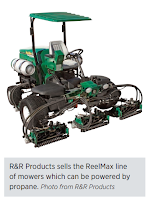As I'm driving along a road in Portland, I happen to notice a landscape truck towing a load of John Deere commercial rotary mowers with propane tanks attached to them. The company happens to be Pacific Landscape Maintenance which belongs to an old college friend of mine from Oregon State. Bob Grover and I both worked together at a large commercial landscape firm in the late 80’s. He has since started his own very successful business on his own. My thought has always been that the golf industry has been cutting edge when it came to mowing technology but it dawned on me that the propane-powered mowing equipment hasn’t necessarily broken through. I became a little set back when I realized that the landscape industry has somehow found the way to cut emissions by over half and also cut the maintenance of their equipment by over half. I wondered when the “big three” were going to jump in and offer a viable option to the golf industry to save money and cut emissions?
I gave Bob a call and asked him how the propane power was working for him. He had nothing but high marks for the performance and the cost savings. The propane was completely accessible and easy to set up. He simply has an inventory of propane tanks which he replaces on each piece of equipment as the gas is depleted. The propane company just comes to his shop every few days and fills the empty tanks. It’s that simple, there is no hassle of having to fill your own tanks, it’s just a matter of using a wrench to unhook and reattach a new tank. Bob said that one tank will generally last a whole day in the field.
More than 130 models of propane-powered commercial lawn mowers are available today from 18 industry-leading brands, including walk-behind, stand-on, and zero-turn-rider options. Some landscape contractors choose to convert existing equipment to propane using EPA- and CARB-certified conversion kits. (1) If the landscape industry is so far along, then what is holding back the golf industry?
For years the Ag industry has used diesel-powered engines to run their irrigation systems but since EPA has mandated a 90 percent emission reduction on all non-road diesel engines the one way they have found to improve emissions is to switch from engines fueled by diesel to those powered by propane. While diesel has long been the fuel of choice for many farmers, increasingly strict emissions regulations and new propane equipment technology are making propane-powered engines a more cost-effective, convenient, and efficient choice for farm irrigation. (2) Instead of making the transition to propane, the golf equipment manufacturers simply started using the new tier IV technology and passed the ever-so-slightly increased costs along to the end users.
 I have yet to hear of a legitimate reason why propane isn’t offered outside of R&R Products. How can we get the other equipment manufacturers to step up and deliver us a product that we can use? I have heard that propane isn’t available in all areas of our country, but I have a hard time believing that. If that were the case, then why does Home Depot sell so many propane BBQ grills across the country?
I have yet to hear of a legitimate reason why propane isn’t offered outside of R&R Products. How can we get the other equipment manufacturers to step up and deliver us a product that we can use? I have heard that propane isn’t available in all areas of our country, but I have a hard time believing that. If that were the case, then why does Home Depot sell so many propane BBQ grills across the country?
If our industry desires a change, then let’s start asking for it. I still believe that the golf industry is on the cutting edge and I am confident that this too will evolve. Talk to your local rep or send letters to their development teams. I really think there is a place for propane in our industry.
On March 23, GCSAA held a webcast called the Plusses of Propane-Powered Equipment. If you are interested in learning more, you can watch the entirety at your own leisure. Find additional information on propane-powered mowing equipment here.
(1) http://www.propane.com/about-propane/#1
(2) https://www.bpnews.com/index.php/publications/magazine/current-issue/712-tier-4-regulations-new-technology-make-propane-an-excellent-fuel-source-for-irrigation-engines
